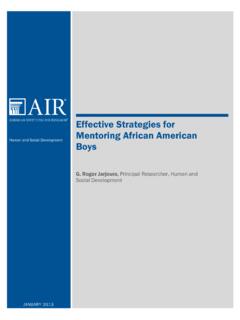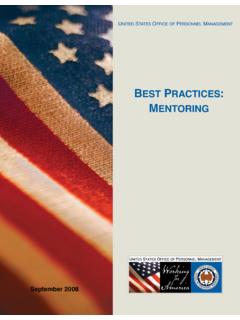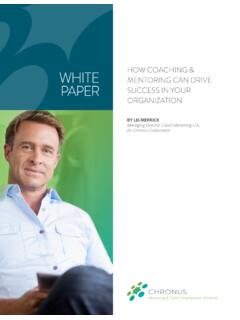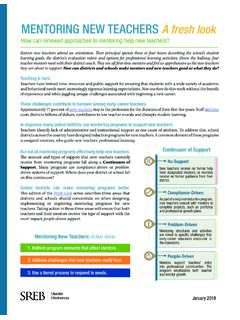Transcription of MENTORING GUIDE - Horace H. Rackham School of …
1 MENTORING GUIDE A GUIDE for Mentors Center for Health Leadership & Practice A Center of the Public Health Institute ii MENTORING GUIDE A GUIDE for Mentors Center for Health Leadership & Practice Public Health Institute Oakland, CA November 2003 This MENTORING GUIDE is based on materials originally developed by the Center for Health Leadership & Practice, Public Health Institute, for the State Health Directors Executive MENTORING and Consultation Program of the State Health Leadership Initiative (SHLI).
2 The SHLI is administered by the National Governors Association with funding provided by the Robert Wood Johnson Foundation. iiiAbout the Author The Center for Health Leadership & Practice (CHLP), a Center of the Public Health Institute, is based in Oakland, CA. CHLP has been engaged in leadership development enterprises (international, national, and California-based) since 1991. Our programs and consultation services include: Custom-designed leadership development strategies and curricula Workshops, retreats, and presentations including collaborative leadership, team dynamics, and cultural proficiency Senior level team building and strategic planning Customized MENTORING programs, and training in coaching and MENTORING skills Succession planning strategies for leaders, team members, and human resources personnel Adult learning approaches, assessment tools.
3 And train the trainer programs to build organizational capacity For further information about CHLP s activities and services and to order additional copies of this GUIDE and its companion, please contact us at: Center for Health Leadership & Practice Public Health Institute 555 12th Street Suite 1032 Oakland, CA 94607 510-285-5586 510-285-5587 (fax) iv Table of Contents What is MENTORING ..1 How Do I Become A Mentor? ..1 Key MENTORING Skills ..3 Stages of Formal MENTORING Stage I: Building the Relationship.
4 6 Stage II: Exchanging Information and Setting Goals ..7 Stage III: Working Towards Goals/Deepening the Engagement ..8 Stage IV: Ending the Formal MENTORING Relationship and Planning for the Appendix I MENTORING Best Appendix II MENTORING Goal Appendix III Selected Annotated 1 What is MENTORING ? In The Odyssey (written by Homer, a Greek poet), Odysseus (known as Ulysses in the Latin translation) was preparing to fight the Trojan War when he realized he would be leaving behind his only son and heir, Telemachus.
5 Since the child was young and wars typically dragged on for years (the Trojan War lasted 10 years), Ulysses entrusted Telemachus care and education to Mentor, his wise, trusted friend. Today, MENTORING is a process in which an experienced individual helps another person develop his or her goals and skills through a series of time-limited, confidential, one-on-one conversations and other learning activities. Mentors also draw benefits from the MENTORING relationship. As a mentor, you will have the opportunity to share your wisdom and experiences, evolve your own thinking, develop a new relationship, and deepen your skills as a mentor.
6 How Do I Become a Mentor? There are many kinds of MENTORING relationships, ranging from informal to formal. An informal MENTORING relationship usually occurs in a spontaneous format. (Think of times you have been helped by someone more experienced than you without explicitly asking to be mentored.) Informal MENTORING may also occur within the context of other relationships such as a supervisory relationship or even peer relationships. A formal MENTORING relationship is characterized by its intentionality the partners in the relationship ask for or offer the MENTORING , establish goals for the relationship and make agreements about its nature.
7 There are also MENTORING programs that facilitate formal MENTORING relationships. A facilitated MENTORING relationship has been defined as ..a structure and series of processes designed to create effective MENTORING relationships; GUIDE the desired behavior change for those involved; and evaluate the results for the prot g s, the mentors and the organization. 1 These MENTORING relationships occur within a structured and defined framework and involve a third party. Often these programs have a specific goal such as helping participants develop their careers.
8 MENTORING relationships can occur at all professional levels. The key feature of a MENTORING relationship is that a more experienced individual helps another achieve his or her goals and develop as a person. The mentor may help the prot g (the person being mentored) develop specific job skills or leadership capacities. The mentor may work in the same organization, have experience in the prot g s organizational context, or have experience in the same field. 1 Murray, M.
9 Beyond the Myths and Magic of MENTORING : How to Facilitate an Effective MENTORING Process. San Francisco: Jossey-Bass Inc., 2001. 2 If you have been approached to be a mentor, or would like to offer to be someone s mentor, reflect on these questions prior to committing to the relationship: What experiences and learning can I bring to the MENTORING relationship? What are my own expectations for the relationship? Are there any obstacles that could impede the relationship s development? This GUIDE will help you develop the skills you need to make the most of the MENTORING relationship, whether formal or informal.
10 Use it to plan your MENTORING interactions. (A companion GUIDE , MENTORING GUIDE : A GUIDE for Prot g s, is also available. See Appendix III.) Although mentors can be sought for various spheres of one s life, this GUIDE focuses on MENTORING within a professional context. The GUIDE s format is intentionally simple and brief to facilitate its use by busy people. 3 Key MENTORING Skills The MENTORING literature shows that mentors and prot g s tend to employ certain MENTORING skills. Research also indicates that these skills can be developed, and that particular skills or competencies seem to result in the most successful MENTORING relationships.










